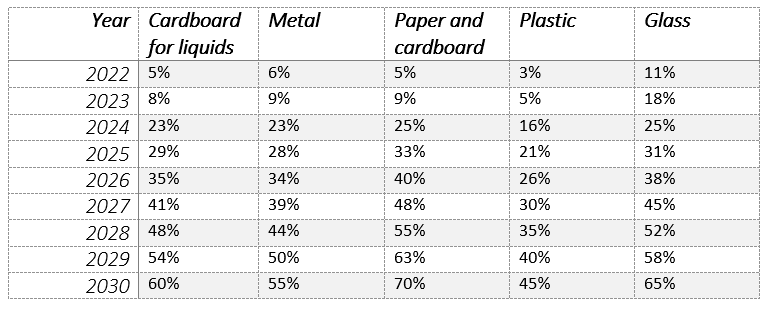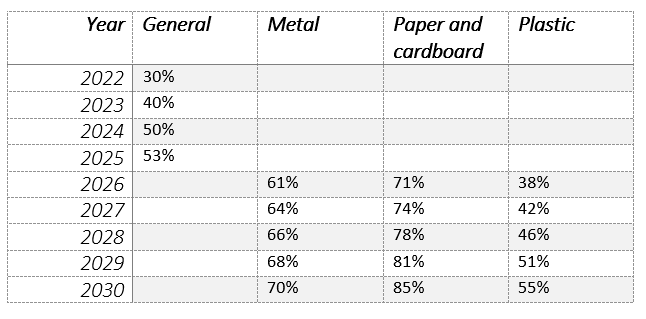Chile introduces packaging EPR
by Ellen Thornton at 14:58 in Emerging, Packaging
Yesterday, the 'Proposed draft decree establishing goals of collection and recycling and associated packaging obligations' was published in Chile's Diario Oficial (official newspaper). The Draft Bill has been published for public consultation and would introduce the polluter pays principle alongside the hierarchy of waste management. Studies conducted by the Chile Ministry of Environment show that the regulation will have greater economic and social benefits compared to its cost in addition to promoting environmental justice.

The purpose of the decree is to establish collection and valorisation goals and other obligations associated with packaging and waste packaging, in order to prevent generation of such waste and encourage its reuse or recovery.
Definitions
Packaging is defined as products made from any material and of any nature that is used to contain, protect, manipulate and/or facilitate the delivery, storage, conservation, transport, or to improve the presentation of goods.
A producer is defined as any person who places packaging or packaged goods for the first time on the national market, that places on the market packaging or packaged merchandise under their own brand when acquired from a third party who is not the first distributor, who imports packaged products or packages products for professional use.
Reporting
There are two main categories of packaging: domestic and non-domestic. Then there are five additional subcategories:
- Cardboard for liquids
- Metal
- Paper and cardboard
- Plastic
- Glass
Only Metal, Paper and cardboard, and Plastic may be considered for non-domestic packaging. Producers who place less than 300 kg of plastic on the market per year are exempt from extended producer responsibility (EPR) obligations. However, they must still report the amount of packaging they place on the market.
Management systems
Management systems, similar to compliance schemes in the EU, will be introduced. Producers can choose to join a collective management system or carry out their obligations individually. Management systems with less than 20 members will be required to meet their collection and recovery goals only with the waste of material types they have placed on the market. Management systems with 20 or more members must meet their collection and recovery goals with any packaging waste. Businesses will be able to deliver packaging waste generated to the management system.
Management systems must submit annually, a progress report by 30th September and a final report by 31st May of the following year. The progress report should include activities carried out between 1st January and 30th June and the final report must do the same for between 1st January and 31st December of the relevant year.
Domestic packaging recovery targets

Non-domestic packaging recovery targets

Recovery targets can only be met through recycling in which the packaging waste is used or recovered, excluding processes that use it, totally or partially, as a source of energy or for the production of fuel. The collection goals will be identical to the recovery goals.
Modulated fees
Producers who are members of collective management systems will be charged a fee to finance the system. The fee will be modulated based on a formula which will establish objective criteria on ease of recovery and recycling, such as compatibility with recycling and eco-design criteria.
Producer obligations
Packaging producers will have incentives to reduce the generation of waste. The producers can present projects to prove the reduction and they will be subsidised in proportion to the effective decrease of packaging placed on the market.
Design, coverage and operation of waste reception and storage facility: Large collective management facilities are obligated to install as least one facility in an area of between 40,000 and 119,999 inhabitants, excluding those of the Metropolitan Region. In areas with 120,000 or more inhabitants, at least two facilities must be installed, adding an additional two facilities for every 80,000 inhabitants in excess of 120,000.
The management systems should perform collection from homes of packaging waste through a uniform collection system throughout the country. The percentage of homes collected from should increase annually until reaching 85% of homes.
Producers of agricultural packaging must limit the presence of dangerous substances and ensure they comply with the health regulations.
Through using modulated fees, collective management systems should modulate fees to recognise and reward eco-design and use of recycled material in packaging.
Public consultation
Natural and/or legal persons may submit observations to the Ministry of Environment regarding this decree within 30 days of its publication (10th June, 2019). The decree will enter into force 24 months after the publication.
If you have any questions regarding EPR in Chile, please don't hesitate to contact us for an obligation assessment. If you're interested in reading more articles and blogs like this one, sign up to receive our free monthly digest.
 Click here to receive regular updates on blog posts, webinars, and regulatory changes directly to your inbox
Click here to receive regular updates on blog posts, webinars, and regulatory changes directly to your inbox

